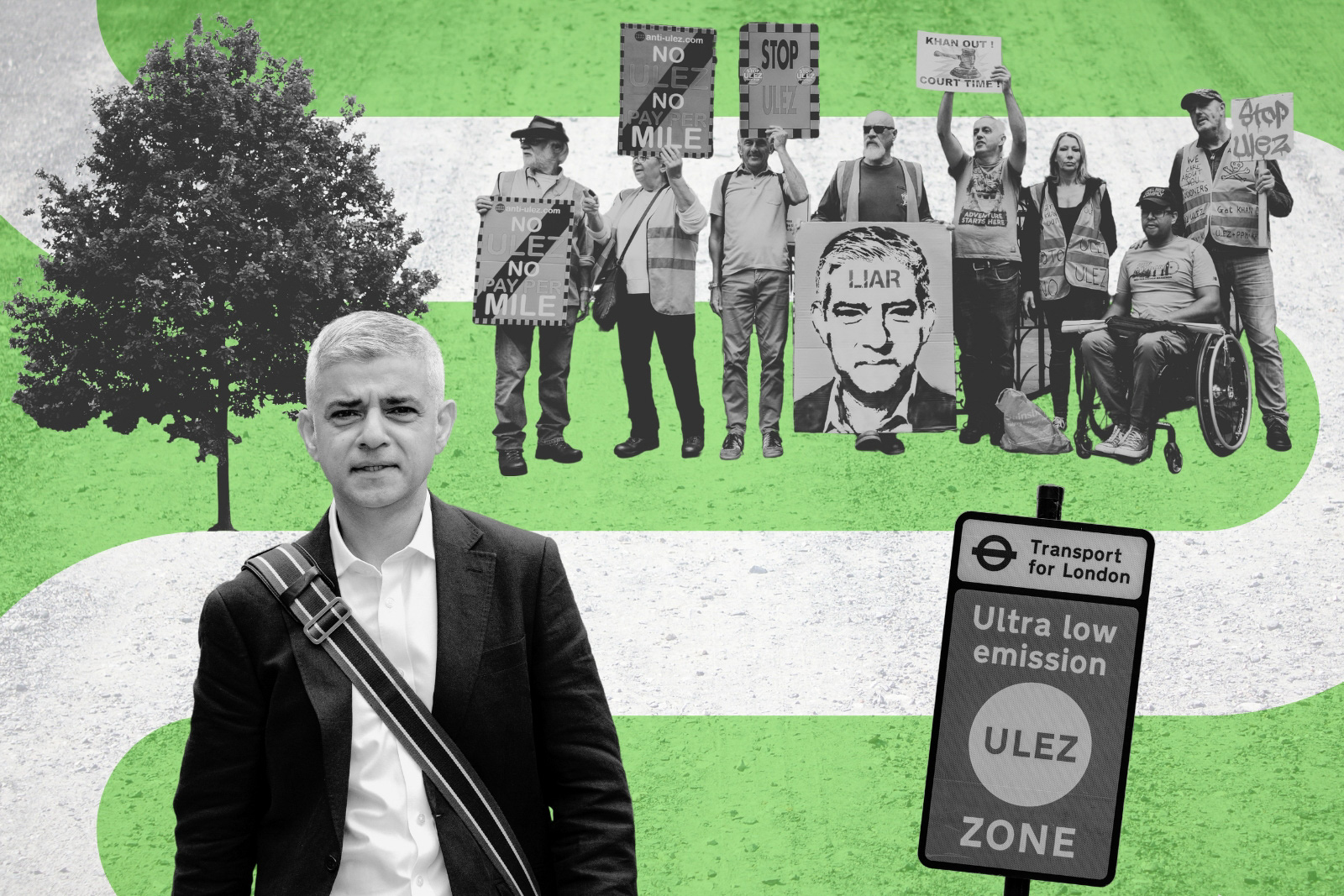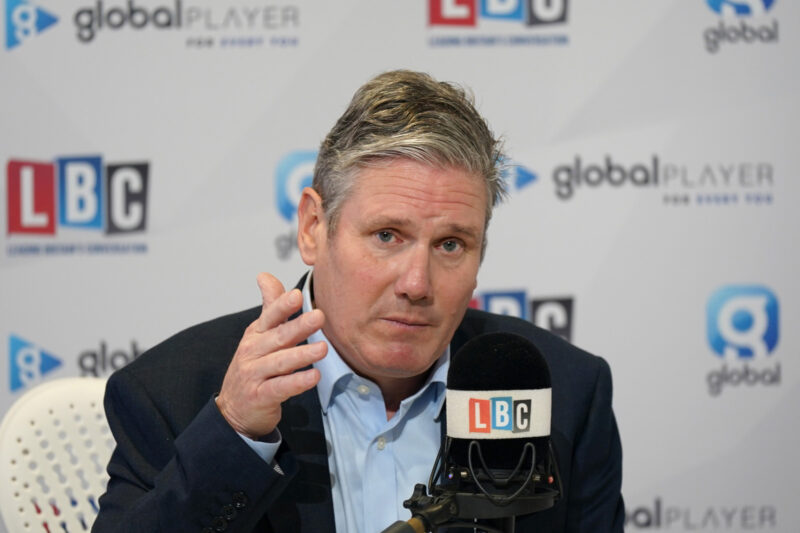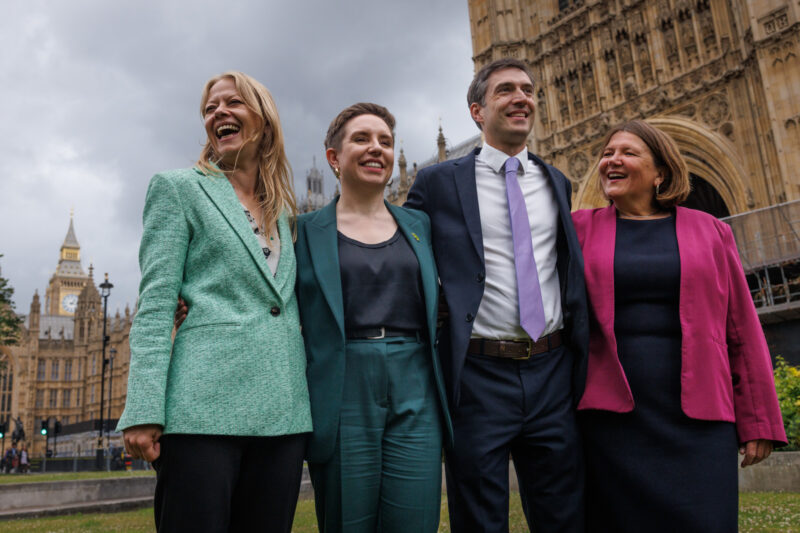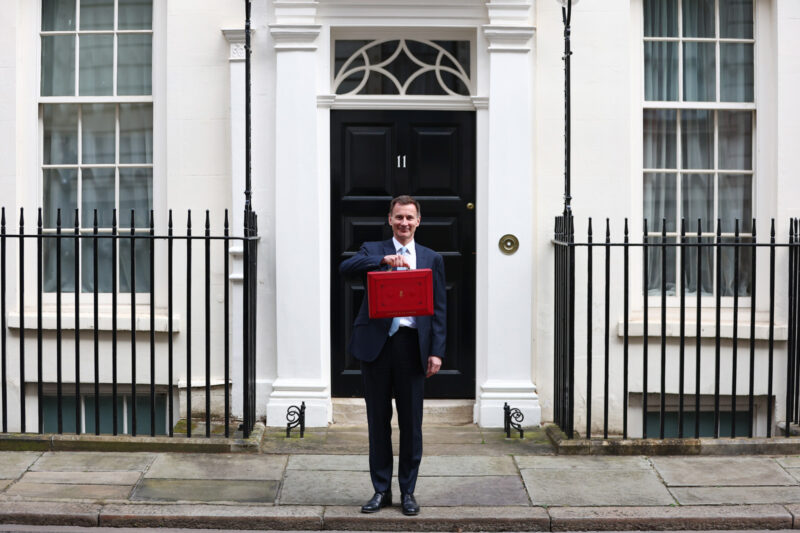How the anti-Ulez movement evolved into an Islamophobic smear campaign against Sadiq Khan
As the mayoral election approaches, the city-wide clean air scheme stands out as Khan’s most divisive policy

Agitated protesters follow the procession behind a cardboard coffin down Bromley High Street in south-east London. Homemade placards are rhythmically raised in the air. The messages are predictable variations on the theme: “Khant Pay, Won’t Pay” and “Blood on your hands Khan”. London Mayor Sadiq Khan’s face is everywhere. It has been spray-painted white on cardboard, with “LIAR” written across in red. It has been photoshopped into a mugshot, with the accompanying warning: “Wanted for crimes against London”.
The dozens of protesters who gathered in February 2023 were demonstrating against the expansion of the Ultra Low Emission Zone (Ulez), the city-wide clean air policy that takes the most polluting cars off London roads. With mayoral elections coming up on 2 May, Ulez has grown into the most divisive policy of Khan’s eight years in the role. Over time, it’s become increasingly tied with a rise in Islamophobic hate against London’s first Muslim mayor — even though the policy was initially touted by then-Conservative mayor Boris Johnson in 2015.
The Ulez expansion came into effect last August, taking about 77,000, or 45% of non-compliant cars off roads within the first month. Vehicles that do not meet the Ulez emissions standards — most petrol cars from before 2005 and diesels before 2015 — now face a £12.50 daily charge to be reinvested into public transport and expanding bus services in outer London.
Opponents claim the scheme penalises the capital’s poorest during a cost-of-living crisis, targeting those who live on the outskirts of London and have to travel in for work. Yet the poorest Londoners are least likely to own a car, and still live in the most polluted areas of the city. Khan has also launched a vehicle scrappage scheme offering £2,000 for non-compliant cars to be scrapped or donated to Ukraine, and has pledged more funding for public transport in outer London.
Despite this resistance, particularly from much of the right-wing press and commentators, 47% of Londoners supported Ulez on the day of its implementation, no doubt because policies like it have been effective in clearing up the city’s pollution. In 2018, a year before Ulez was introduced in central London, the capital had broken its pollution limits for the whole year in just one month.
Research shows London’s clean air policies have helped cut its road pollution faster than the rest of the country. Yet Khan’s critics still cling to any minor Ulez discontent, and increasingly this discourse has included Islamophobic and xenophobic comments across social media and online forums.
In anti-Ulez Facebook groups seen by Hyphen, some of which have tens of thousands of members, posts portray Khan through racist caricatures. There are also countless false claims and conspiracies about “Londonistan” and the presence of an “Islamist mob rule”.
In one local group there was an image of two security staff guarding Ulez cameras followed by a stream of xenophobic posts towards the men of colour, including: “Now do you see what our rulers are shipping the illegals in for?” and “Looks like Khan is importing his own.”
This rhetoric is mirrored in the higher echelons of politics. In February, Lee Anderson, the former deputy Tory party chairman, who has long been outspoken against Ulez, was suspended from the Conservative party for saying that “Islamists” had got “control” of the mayor of London. He has since doubled down, suggesting those decrying the Ulez expansion are less concerned about the policy itself and more inclined to wield it as a weapon for personal attacks against the Muslim mayor.
It reflects a wider rise in Islamophobia across the country. The UK has seen a 335% increase in anti-Muslim hate cases in the past six months, according to Tell MAMA, a national project that records such incidents. “This rise in anti-Muslim hate is unacceptable, and we hope that political leaders speak out to send a clear message,” said Iman Atta, the organisation’s director.
There is also a lack of robust moderation against anti-Muslim hate online. Research by the UK- and US-based Center for Countering Digital Hate shows that social media companies are failing to act on anti-Muslim hate 89% of the time. “The conspiracist and racist content identified in this report spreads and perpetuates hatred of Muslims and their faith,” Imran Ahmed, the chief executive of CCDH, said in a statement.
“In 2019, the Ulez was not on the frontier of a culture war, and opposition to it was not seen as an effective way to gain political capital. That changed in 2023,” says Leo Murray, co-director of climate charity Possible, citing Labour’s unexpected loss of the Uxbridge and South Ruislip by-election, which Keir Starmer blamed on the mayor’s Ulez expansion plans.
Before this local election, Khan’s political opponents in the outer boroughs of London had circulated misleading information about Ulez plans, leading huge numbers of people to mistakenly panic about their vehicles when there was no need. “At the time, even Tesla owners were reportedly up in arms about being charged and fined under the Ulez,” Murray continues. “An army of bots, funded by undisclosed sources, also amplified anti-Ulez content and promoted it onto social media users’ timelines.”
During the current mayoral campaign, the Conservative party — whose candidate Susan Hall has vowed to end the Ulez expansion — has been criticised for sharing flyers detailing false claims that Khan plans to introduce pay-per-mile road charging.
Like any other policy, the Ulez scheme has had teething issues, some of which have exposed the fast-rising prevalence of “car-cloning” — vehicle identity theft which has resulted in innocent car owners receiving fines such as speeding or penalties from Ulez — and mistakes in the issuing of fines. But it’s clear that Khan has faced disproportionate levels of hate surrounding the clean air scheme. “When you’ve got friends and family who see this stuff, it’s deeply upsetting,” he told the BBC in February, discussing his experiences of online trolling. In April, a group of around 100 anti-Ulez protesters converged around Khan’s home in south London.
The fact that a public health policy has been used as Khan’s beating stick tells you just how little else his opposition has to go on in a political campaign against him. With a 19-point lead over Susan Hall in the polls, anti-Ulez discontent is unlikely to cost Khan the upcoming election. So a new question emerges: where does all this unchecked anger go?
 Newsletter
Newsletter













